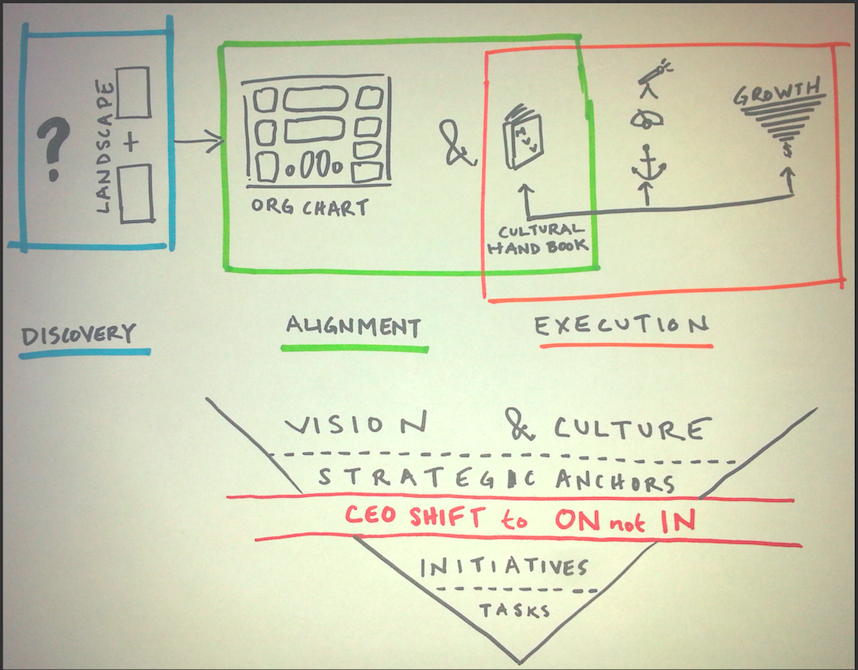A group of Acts 29 pastors gathered for our monthly lunch together. It was during this time we provide just-in-time coaching to those who would like to bring things to the table. At this meeting three different churches discussed how to operate as a plurality of elders and yet make decisions when there is disagreement. Several suggestions were given including weighing in how strongly you feel about the issue, but at the end of the day almost all church planter/pastors brought up the belief that there must be a first amongst equals. Several people had tried to operate in a plurality of eldership without this, but both failed. Further explanation:
First Among a Council of Equals: Leaders Among Leaders: An extremely important but terribly misunderstood aspect of biblical eldership is the principle of "first among equals" (1 Tim. 5:17). Failure to understand this principle has caused some elderships to be tragically ineffective in their pastoral care and leadership. Although elders are to act jointly as a council and share equal authority and responsibility for the leadership of the church, all elders are not equal in their giftedness, biblical knowledge, leadership ability, experience, or dedication. Therefore, those among the elders who are particularly gifted leaders and/or teachers will naturally stand out among the other elders as leaders and teachers within the leadership body.
…the "first-among-equals" concept is evidenced by the way in which congregations are to honor their elders. Concerning elders within the church in Ephesus, Paul writes, "Let the elders who rule well be considered worthy of double honor, especially those who work hard at preaching and teaching. For the Scripture says, 'You shall not muzzle the ox while he is threshing,' and 'The laborer is worthy of his wages' " (1 Tim. 5:17,18). All elders must be able to teach the Word, but not all of them desire to work fully at preaching and teaching. The local church should properly care for those who are specially gifted in teaching and spend the time to do so. Let us be clear about the fact that it is the spiritual giftedness of the elders that causes the church to grow and prosper spiritually, not just the eldership form of government per se.
Source: BIBLICAL ELDERSHIP Restoring the Eldership to Its Rightful Place in the Church (pdf) NOTE: This excerpt is from an abridgment of Biblical Eldership: An Urgent Call to Restore Biblical Church Eldership by Alexander Strauch.
So how does this work? How are you operating as a plurality of elders? Do you have a first amongst equals?
One of the ways I've been thinking about this is that as you look at a church as corporation, cause & community there will be elder(s) whose 'cause' is the mission/movement. Taking from Outgrowing the Ingrown Church by C. John Miller, this is a 'missional pacesetter who is able to break through the church's natural tendency to erect barriers to guarantee the church's comfort and safety'. This does not mean they are maverick decision makers but that they are focused on the cause of mission/movement in such a way that their gifts are being exercised in moving the mission forward.
At Kaleo Church, while David Fairchild is the primary preaching elder, I have never seen him use this position as leverage to demand his way. He builds consensus and seeks for unanimity even though many people at Kaleo might consider him the 'head pastor' because they are not aware of how decisions are made. Releasing the elders to be on mission flows from a shared commitment to the corporate convictions. This requires great trust between the elders, because other elders will have their own 'causes' that are guided by the normative/vision/values (corporate). The plurality releases individual elders to make decisions at the edges of the church, advancing the mission or cause.
All of this requires a shift for many traditional churches from a Pastoral to a Missional Church leadership paradigm. For this, I'd recommend The Missional Leader: Equipping Your Church to Reach a Changing World by Alan Roxburgh and Fred Romanuk. Their contrast of Pastoral & Missional Church leadership is excellent. For example:
|
Pastoral |
Missional |
|
Expectation that an ordained pastor must be present at every meeting or event or else it is not validated or important. |
Ministry staff operate as coaches and mentors within a system that is not dependent on them to validate the importance and function of every group by being present. |
|
Ordained ministry staff functions to give attention to and take care of people in the church by being present for people as they are needed (if care and attention are given by people other than ordained clergy, it may be more appropriate and effective but is deemed "second-class"). |
Ordained clergy equip and release the multiple ministries of the people of God throughout the church. |
|
Time, energy, and focus shaped by people "need" and "pain" agendas. |
|
|
Pastor provides solutions. |
Pastor asks questions that cultivate an environment that engages the imagination, creativity, and gifts of God's people in order to discern solutions. |
|
Expectation that an ordained pastor must be present at every meeting and event or else it is not validated or important. Preaching and teaching offer answers and tell people what is right and wrong.
|
Preaching and teaching
|
|
"Professional" Christians |
"Pastoring" must be part of the mix, but not the sum total. |
|
Celebrity (must be a "home run hitter") |
|
|
"Peacemaker" |
Make tension OK |
|
Conflict suppressor or "fixer" |
Conflict facilitator |
|
Keep playing the whole game as though we are still the major league team andthe major league players. Continue the mythology that "This staff is the New York Yankees of the Church world!" |
Indwell the local and contextual; cultivate the capacity for the congregation to ask imaginative questions about its present and its next stages. |
|
"Recovery" expert ("Make it like it used to be") |
Cultivator of imagination and creativity |
|
Function as the manage, maintainer, or resource agent of a series of centralized ministries focused in and around the building that everone must support. Always bee seen as the champion and primary support agent for everyone's specific ministry |
Create an environment that releases and nourishes the missional imagination of all people through diverse ministries and missional teams that affect their various communities, the city, nation, and world with the gospel of Jesus Christ. |


